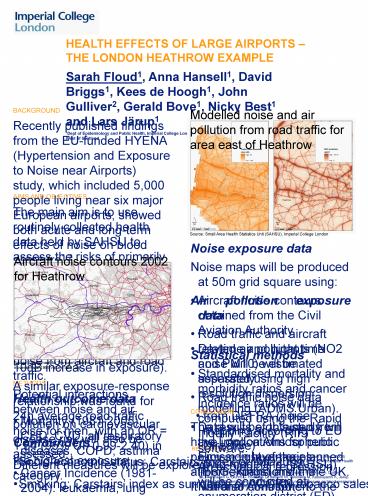METHODS - PowerPoint PPT Presentation
1 / 1
Title:
METHODS
Description:
... time noise will be estimated separately. Road traffic noise data ... The modelled concentrations will be validated against monitoring data in the study area. ... – PowerPoint PPT presentation
Number of Views:18
Avg rating:3.0/5.0
Title: METHODS
1
HEALTH EFFECTS OF LARGE AIRPORTS THE LONDON
HEATHROW EXAMPLE
Sarah Floud1, Anna Hansell1, David Briggs1, Kees
de Hoogh1, John Gulliver2, Gerald Bove1, Nicky
Best1 and Lars Järup1 1Dept of Epidemiology and
Public Health, Imperial College London
2Environmental Initiatives Research Group (EIRG),
University of the West of Scotland
BACKGROUND Recently published findings from the
EU-funded HYENA (Hypertension and Exposure to
Noise near Airports) study, which included 5,000
people living near six major European airports,
showed both acute and long-term effects of noise
on blood pressure1 2. There was an
exposure-response relationship between aircraft
noise at night and increased risk of hypertension
(OR 1.14 (95 CI 1.01-1.29) per 10dB increase
in exposure). A similar exposure-response
relationship was found for 24h average road
traffic noise for men, with an OR 1.54 (95 CI
0.99-2.40) in the highest exposure category.
AIMS AND OBJECTIVES The main aim is to use
routinely collected health data held by SAHSU to
assess the risks of primarily cardiovascular and
respiratory diseases, but also some cancers in
the area around London Heathrow Airport, affected
by both air pollution and noise from aircraft and
road traffic. Potential interactions between
noise and air pollution on cardiovascular disease
risk will also be assessed.
- Noise exposure data
- Noise maps will be produced at 50m grid square
using - Aircraft noise contours obtained from the Civil
Aviation Authority - Daytime and night time noise will be estimated
separately - Road traffic noise data
- from DEFRA (noise mapping according to EU
Directive) - own modelling (SAHSU)
- Air pollution exposure data
- Road traffic and aircraft related air pollutants
(NO2 and PM10) will be assessed using high
resolution dispersion modelling (ADMS Urban). - Data will be obtained from the London Atmospheric
Emission Inventories (ERG, Kings) and the
National Atmospheric Emission Inventory in order
to cover the area surrounding Heathrow. - The modelled concentrations will be validated
against monitoring data in the study area.
- Statistical methods
- Standardised mortality and morbidity ratios and
cancer incidence ratios will be computed using
the Rapid Inquiry Facility (RIF) software. - An ecological regression will be conducted at
enumeration district (ED) level to assess the
relationship between the exposure indices and the
health outcomes. Bayesian hierarchical models
will be used to obtain more stable estimates of
the area-level disease risks. - Individual level data on blood pressure and
potential confounders are available from the
HYENA study.
- METHODS
- Health outcome data
- Mortality (1981-2005) CHD, CVD, all respiratory
diseases, COPD, asthma - Cancer Incidence (1981-2004) leukaemia, lung
cancer - Hospital Episode Statistics (1989-2005)
hypertensive disease, asthma, COPD
CONCLUSION The results of this study will have
implications for public policy in light of the
planned airport expansions in the UK. It will
also contribute to the evidence base for European
policy on noise abatement and air pollution
regulation.
- REFERENCES
- Jarup L, Babisch W, Houthuijs D, Pershagen G,
Katsouyanni K, Cadum E, et al. (2008)
Hypertension and exposure to noise near airports
- the HYENA study. Environmental Health
Perspectives 116329333. - Haralabidis AS, Dimakopoulou K, Vigna-Taglianti
F, Giampaolo M, Borgini A, Dudley ML, Pershagen
G, Bluhm G, Houthuijs D, Babisch W, Velonakis M,
Katsouyanni K, Jarup L, for the HYENA consortium.
Acute effects of night-time noise exposure on
blood pressure in populations living near
airports Eur Heart J 200829658-64.































